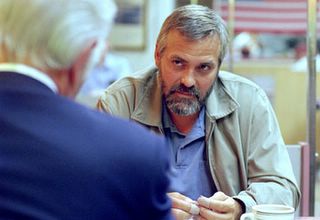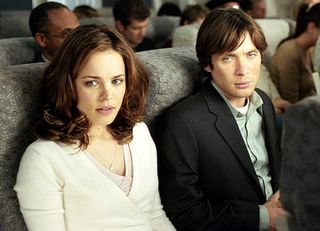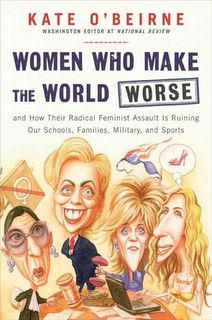Among its various observations about the inner workings and organization of the oil industry, Syriana makes an argument I sense most Americans would find surprising, if not dubious - that American business, and accordingly the American government, despite all its favorable talk about Mid-East freedom and democracy, actively works against forward-thinking, socially-liberal Muslim leaders.
Using the merger of two large oil conglomerates as a loose structure, Syriana critiques the standard operating procedure of Big Oil on a number of fronts. Though the film is extremely dry and muddled, sacrificing any sort of power or resonance it might have for a cavalcade of information, analysis and context, one segment that does connect concerns Prince Nasir Al-Subaii (Alexander Siddig, in the film's best performance).
A forward-thinking heir to a rich oil empire, Al-Subaii seeks to reap as much profit from selling oil as possible, and to use this money to install in his country the very same principles of liberal democracy the U.S. purports to seek. Unfortunately, as the American commodities trader he hires as an advisor (Matt Damon) soon comes to understand, powerful American interests that demand reliable and cheap access to their source of revenue will not allow this sort of unpredictable development.
This is powerful, timely stuff, and Gaghan navigates the complicated waters successfully. I was struck, in particular, by how well Siddig and Damon make these characters realistic and compelling despite having such little screen time, and having to deal with so much complicated, wonky material and exposition.
Regrettably, not all of the film's various strands deliver with such potency. It's a hit-and-miss kind of affair.

Writer/director Stephen Gaghan, who penned the similarly well-researched the thorough Traffic, can definitely be admired for his ambition. Syriana spans the globe, takes on the government and American business, challenges stereotypes about Muslims and the Middle East and brings together an immense ensemble of terrific actors, including a bulky George Clooney, Damon, Christopher Plummer, William Hurt, Jeffrey Wright and Chris Cooper. Having said that, the thing barely qualifies as a movie.
I guess it's almost a mockumentary. If I were to set out to make a non-fiction film about the Oil Industry, I'd (ideally) try to capture the kind of footage Gaghan has scripted and then filmed - a lawyer representing a big oil firm (Wright), some oil executivse (Cooper, Plummer) a Wall Street oil trader (Damon), some oil-rich sheiks and Mid-East politicos (Siddig, Amr Waked and others). Maybe I'd go off on a small tangent and deal with the issue of terrorists-in-training, and how their disillusionment with the promise of Western freedoms caused their descent into violence and suicidal thoughts. Maybe I'd even try to get an interview with a CIA spook going out on intelligence operations (Clooney).
You see what I'm saying...It's an interesting idea, and Syriana is certainly illuminating. I'm not sure if it contained a lot of information or content that was completely new to me, but it certainly organizes a lot of aspects of the topic into a more complete, contextual whole.
But when I say it's not a "movie," I mean that it's not very entertaining, that it's intentionally confusing and unfocused, and that I, personally, would never ever want to watch it again. The thing vascillates between three modes: DULL->INTRIGUING->OVERBLOWN
Imagine it as a mobius strip...When it's done being overblown, it goes back to being dull, and then intriguing and over and over again.
Sometimes, all within the same vignette or sequence.
Take the Clooney character's story. He's Bob Barnes, some sort of former agent working out of the Middle East. He's given a new assignment (possibly as a way of getting rid of him after he pesters his superiors with memos about his previous assignment) in Beirut, Lebanon, where things go...let's say poorly. As his story opens, it's dull. He blathers on with William Hurt about U.S. intervention in Middle Eastern nations, gets his new assignment, whatever. Gaghan doesn't let us inside his perspective at all (and his secrecy makes sense, being a secret agent and all...), but it doesn't exactly make watching Barnes interact with others, speaking complicated jargon, exciting to watch.
Soon enough, his story becomes compelling. He goes to Beirut. He must clear his presence there with the terrorist group Hezbollah first. Then, he must attempt to hunt down a missile that might be used against a U.S. target. This is entertaining, fleet stuff that Gaghan handles well.
But by the end of Clooney's story, he's gone way too far. What starts as an intriguing story has become something of a shrill polemic, a screed as opposed to a story that earns its transitions and makes sense.
Ditto the Jeffrey Wright scenario, which culminates in a loopy monologue on the streets of Washington D.C. by Tim Blake Nelson. You may have seen a bit of it in the trailer. Thanks to IMDB, here is Nelson's speech, as transcribed by Some Bozo With Too Much Time on His Hands:
Some trust fund prosecutor, got off-message at Brown, thinks he's gonna run this up the flagpole, make a name for himself, maybe get elected some two-bit, no-name congressman from nowhere, with the result that Russia or China can suddenly start having, at our expense, all the advantages we enjoy here. No, I tell you. No, sir. "But, Danny, these are sovereign nations." Sovereign nations! What is a sovereign nation, but a collective of greed run by one individual? "But, Danny, they're codified by the U.N. charter!" Legitimized gangsterism on a global basis that has no more validity than an agreement between the Crips and the Bloods! Corruption charges. Corruption? Corruption ain't nothing more than government intrusion into market efficiencies in the form of regulation. That's Milton Friedman. He got a goddamn Nobel Prize. We have laws against it precisely so we can get away with it. Corruption is our protection. Corruption is what keeps us safe and warm. Corruption is why you and I are prancing around here instead of fighting each other for scraps of meat out in the streets. Corruption is why we win.
Sigh...
As I argued in my review of Serenity, people who do evil things don't really think of themselves most of the time as evil. They think they are just, or maybe they haven't even given it any thought because they consider such thoughts of "right" and "wrong" as inefficient or whatever. But this sort of "I Love Corruption!" "I am a being of ultimate and spectacular eeeeeevil" crap is just ridiculous movie fantasy.
And the fact that he yells this monologue at someone in broad daylight on a city street is patently ludicrous. He's a recognizable guy - he's on TV every day! Tell me next time you hear about Jack Abramoff cackling in his Borsalino about how he loves corruption.
Gaghan's scripts are extremely detailed, smart and, as I said, thorough. You get a sense that he really immerses himself in a topic, and strives to bring in as many facets to his argument as possible. (Notice I said "facets to his argument," and not viewpoints. Both Traffic and this film, and Havoc, which he also wrote, contain very specific, biased points of view. These films are persuasive in nature...Lots of people seem to get that mixed up in reviews I read, claiming that the films represent a broad cross-section of opinions about these topics. They don't).
But he's not really A-#1 with character or dialogue. Traffic had its lurid, goofy "white kids doing crack in the ghetto" story. Not a single scene of Havoc rang true about teenage life. And Syriana features a lot of underwritten mush in between all the op-ed fodder. Not just the Nelson character, but also Amanda Peet as Damon's greiving wife and surprisingly flat performances from the always-reliable Chrises, Cooper and Plummer. These people just sit there on screen, place-holders. They're important to Gaghan, and therefore us, because of what they represent, but not at all because of who they are.
I'm surprised to see Syriana on so many Best of the Year lists, frankly. The BEST political films work their outlook into a film, expressing opinions artistically and cinematically. If you want to express a piece of political philosophy, write an essay. Or a book. Or a letter to the editor. I think we have three political films from the second half of 2005 that form kind of a continuum of Political Filmmaking in General.
At one end, you have Constant Gardener, a movie that strives for a strong political message but really just winds up with a predictable thriller movie with some unseen executives as the bad guys. It gets the movie elements right (basically), but has little-to-nothing to say.
In the middle, representing the pinnacle of this time of filmmaking, is Steven Spielberg's Munich, my pick for the best overall film of 2005. Spielberg combines a strong, clearly stated and easily-expressed point of view with an extremely compelling, tight narrative. The results speak for themselves...A film of intense power and resonant meaning. That's the kind of movie that will alter perpsectives in a real and lasting way.
Then, on the other end, you have Syriana, a movie that's like attending an interesting lecture that bores the shit out of you. You're taking notes, yes, and you want to be able to sound like you understood everything when you have coffee with your classmates later, but you're secretly checking the clock on your cell phone every 5 minutes because SERIOUSLY will this thing ever freaking end?





